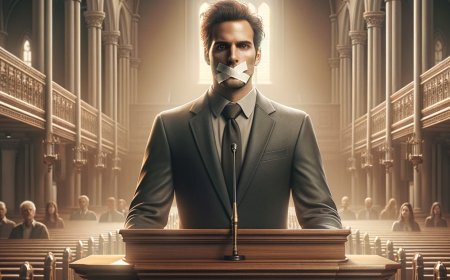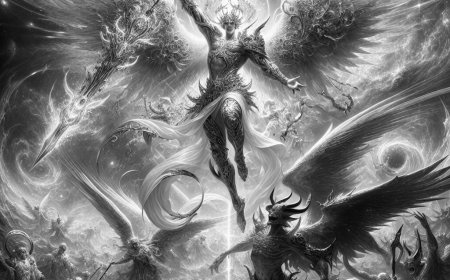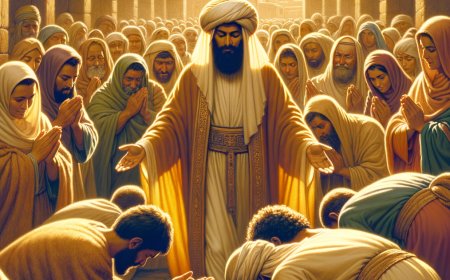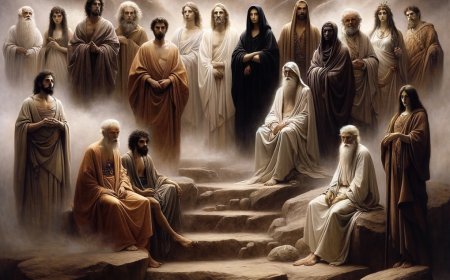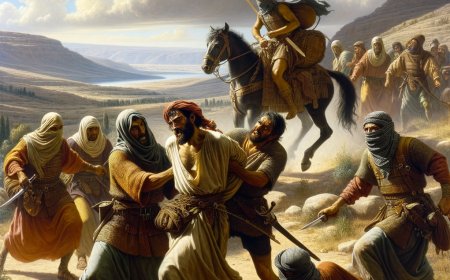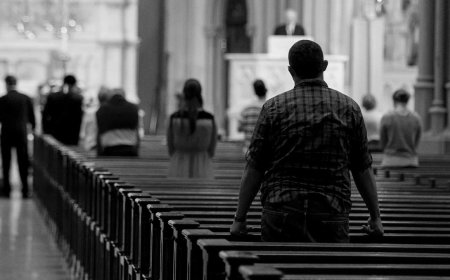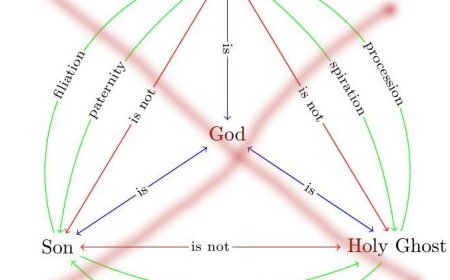The Person of Jesus and the Christian Ministry
Church leaders must teach believers, new and old, to bring forth fruit. They must teach them to be like Christ and walk in the spirit of love toward others in the church, and in the world. If a believer does not bring forth fruit, they will always walk in the lust of the flesh.

For people who profess to be Christians, the Bible encourages them to be like Jesus Christ himself and to think and live the same as Jesus did during his life. The scripture says: “Let this mind be in you, which was also in Christ Jesus:” Philippians 2:5. Chapter two of Philippians describes the mind of Christ and how we as believers should think toward others and about ourselves. Verse 4 reads: “Look not every man on his own things, but every man also on the things of others.”
One basic principle of being a Christian is selflessness. We should first think of others before ourselves. We must show concern for others and their well-being in life, and neither should we be jealous of others or exalt ourselves above others, but esteem ourselves lower than them. Verse 7 reads: “but made himself of no reputation, and took upon him the form of a servant.”
This mindset calls for humility in ourselves, humbleness and meekness, not boisterous, arrogant, or above the character of others. This is not thinking like or having the mind of Christ. This is having the mind of the world. When we exalt ourselves above others and consider them lower than ourselves, we tend to look for wrongs and faults in others and judge them, condemning them and their lifestyle.
Jesus never condemned individuals for their sins, but he forgave them of their sins instead. The only people that Jesus condemned were those who were supposed to teach the law, the scribes and the Pharisees and Chief Priest, because they were not teaching the law according to righteousness, mercy, and faith, but of tradition of men. “But in vain they do worship me, Teaching for doctrines the commandments of men.” St. Matt. 15:9.
The people who suffered under the false doctrine of the leaders were not blamed for their sins and shortcomings but were forgiven by Christ. This is shown many times in the gospels during Jesus’ ministry as he walked among the people. To forgive sins, a person must have understanding of those sins and why the person became bound in the first place. If we have no understanding, there can be no forgiveness. “Charity (Love) covers a multitude of sins.” 1 Peter 4:8.
Before Jesus walked the earth among the people, the prophet Isaiah in chapter 53 of his book foretold of Jesus and the type of person he would be. The characteristics of Christ in Isaiah should also be in every person who claims to be a Christian. We will walk through each verse of Isaiah 53 to breakdown those characteristics.
1. Who hath believed our report? and to whom is the arm of the LORD revealed?
2. For he shall grow up before him as a tender plant, and as a root out of a dry ground: he hath no form nor comeliness; and when we shall see him, there is no beauty that we should desire him.
3. He is despised and rejected of men; a man of sorrows, and acquainted with grief: and we hid as it were our faces from him; he was despised, and we esteemed him not.
4 Surely he hath borne our griefs, and carried our sorrows: yet we did esteem him stricken, smitten of God, and afflicted.
5 But he was wounded for our transgressions, he was bruised for our iniquities: the chastisement of our peace was upon him; and with his stripes we are healed.
6 All we like sheep have gone astray; we have turned every one to his own way; and the LORD hath laid on him the iniquity of us all.
7. He was oppressed, and he was afflicted, yet he opened not his mouth: he is brought as a lamb to the slaughter, and as a sheep before her shearers is dumb, so he openeth not his mouth.
8. He was taken from prison and from judgment: and who shall declare his generation? for he was cut off out of the land of the living: for the transgression of my people was he stricken.
9. And he made his grave with the wicked, and with the rich in his death; because he had done no violence, neither was any deceit in his mouth.
Examining the above passage from the beginning, the prophet asked who among the children of Israel has believed this report about the coming Messiah and to whom would the arm of the Lord (the Lord at the time was God himself and the arm of the Lord was an extension of God reaching out to man, being his son, the person of Jesus Christ).
Once the Messiah was born, we can see that he was born a common person as described as being “as a tender plant,” and “as a root out of dry ground,” and would grow up before him (God) as new and untouched by the world; as humble and as lowly in spirit as a tender plant and from the roots of a people of a dry and earthy element, not out of earthy royalty of a rich, fertile soil.
He had to be this way in order for God to shape and mold him into what he needed him to be. A born-again Christian is the same. They are new and humble, no longer tainted by the elements of the world so God can teach them to be like his son Christ.
The verse goes on to quote, “he hath no form nor comeliness; and when we shall see him, there is no beauty that we should desire him.” According to the description, there was nothing physically special about Jesus and he was not considered comely, which means attractive. He was not considered beautiful as a standard of the world would consider beauty, but he was an average guy born of modest appearance.
Verse 3 states, “He is despised and rejected of men;” which means that he was not popular at all in the standards of popular culture, celebrity status or famous among men and society. He was just the opposite. Men hated him and rejected anything he said and taught. Despite the many people who followed him, there were more people who did not believe in him. He spoke to a certain group of people who followed and gathered around him, and he often traveled from place to place not remaining in any particular city or town for an extended amount of time.
It goes on the say; “a man of sorrows, and acquainted with grief: and we hid as it were our faces from him; he was despised, and we esteemed him not.” There is not much documented about Jesus’ rejoicing and dancing in the spirit, he was serious about his father’s business and stayed focused on his mission. He attended a wedding and many times stopped at people’s houses to dine or heal their family members, so he was not a popular figure among the world, but only them who believed in him and sought for his presence.
Jesus did not have hundreds of friends but had a small circle of followers who were his disciples. He was acquainted with grief and sorrow because he cared so much more about the people more than himself, and he lived daily to bring peace and healing to others. Many people were jealous of him and did not like him because of who he was and because he did not project himself as the other leaders in the synagogue did, as authoritative figures, prosperous or successful, nor did he live his life as such. In fact, people would avoid him when they saw him coming because they did not want to be associated with such a lowly, unpopular person.
Verse 4 reads: “Surely he hath borne our griefs, and carried our sorrows: yet we did esteem him stricken, smitten of God, and afflicted.” Even though Jesus cared so much for the people as he does us now and our own sins, many still did not appreciate what he was doing for them. But because of his humbleness and lowliness, people rather considered him cursed, rejected or ignored of God. He was not a part of the culture they were used to, so they felt that God was not with Jesus because he did not have the things other church leaders had and did not practice religion and the traditions as the others did.
Verse 5 and 6 testify to the things Jesus suffered for us all as he was wounded for our transgressions and bruised for our iniquities. He learned life the hard way being chastised for our sins and taking the stripes so we can be healed. We as believers must remember to pray this prayer when we need healing and deliverance from certain sins. Our sins are forgiven because he suffered for us and for the sins of the world. If we sin, we must go to him and ask for forgiveness and not return to our sins. “If we confess our sins, he is faithful and just to forgive us our sins, and to cleanse us from all unrighteousness.” St. John 1:9.
Verse 7 says, “He was oppressed, and he was afflicted, yet he opened not his mouth:” Jesus did not live in the world on the side of the oppressor; he lived in the world of the oppressed. He felt the affliction of the oppressed like many people during those times (and today), who spoke against the wrongs of authority and who sought for relief and peace. Jesus would identify most with the oppressed of today instead of the rich, famous and prosperous.
“…he is brought as a lamb to the slaughter, and as a sheep before her shearers is dumb…He was taken from prison and from judgment:” Verse 7, 8. Jesus was not given a fair trial. He was imprisoned and judged based on accusations from false witnesses, but he did not complain or open his mouth. By doing nothing, he was proving the injustice of the world, so they had no excuse when the judgment of God was come. Like many people today under the government rule of injustice, Jesus faced his fate without a justifiable rebuttal that would be recognized by the courts. “…and who shall declare his generation? for he was cut off out of the land of the living: for the transgression of my people was he stricken.”
Like many people today, Jesus was considered a misfit and a menace to society. His citizenship was revoked, and he was cut off from the privileges of society according to the cultural standards of that day. In many ways, Jesus was persecuted simply for being born the person he was and the things he taught.
Verse 9 reads; “And he made his grave with the wicked, and with the rich in his death; because he had done no violence, neither was any deceit in his mouth.” He died as a criminal and like the wicked of society and he died without money or riches but shared a grave with the rich who also sinned against society. He did not commit acts of violence or fight back against the courts of injustice and neither did he lie to get himself out of his situation or to cover for who he was. On the contrary, Jesus died with all his dignity and integrity, and as a preacher of truth and justice.
The New Testament Ministry
During his life and ministry, Jesus walked the land of Galilee, Jerusalem and Judea preaching the gospel of peace, love, and righteousness. Though he was anointed by God in the spirit of humility, he was also anointed with authority, truth, and power. He taught the people with love and understanding, and he did not charge money for his sermons or gatherings, and he did not have to con anyone to attend. He did not sell his teachings as books, nor did he sell holy water, scarves or cups that he owned. When he was not preaching the word of the Kingdom, he was healing people of sickness and disease by calling on their faith in God.
Though Jesus was gentle and merciful toward the crowds of people, he spoke with more authority and conviction toward the leaders of the churches and synagogues. In St. Matthew 23:2, 3 he says; “The scribes and the Pharisees sit in Moses' seat: All therefore whatsoever they bid you observe, that observe and do; but do not ye after their works: for they say, and do not.” He warned the people to do what the Bible says do, but do not do what the leaders were doing because they were not practicing what they actually preached, and they were misrepresenting God in the scriptures.
He often called the leaders hypocrites, serpents, and a generation of vipers. In verse 25 he says, “Woe unto you, scribes and Pharisees, hypocrites! for ye make clean the outside of the cup and of the platter, but within they are full of extortion and excess.” Jesus taught the people that the church leaders looked like leaders but they were in fact, full of deception and crookedness, seeking after riches and wealth and to increase their profitability at the expense of the poor.
As a result, the leaders accused Jesus of heresy and sedition and even accused him of making himself equal with God, which caused them to bring him before King Herod for a trial so he could be prosecuted and put to death. His disciples tried to convince Jesus to fight against the leaders and the soldiers of the Roman army, but Jesus refused and told them; “Put up again thy sword into his place: for all they that take the sword shall perish with the sword,” St. Matthew 26:52, thus he taught his disciples nonviolence against a violent and aggressive government.
In many of his sermons and parables he taught the people to be humble, content with their wages and to not seek after riches and wealth. He did not encourage people on prosperity and financial growth. He did not blame the poor for being poor but taught them the truth of inequality, oppression and injustice, as he spoke against the self-righteous, rich men and unfair rulers of society. He taught the people to treat their neighbors fairly and to remember the poor and the sick, and the widows and fatherless children. He did not teach survival of the fittest, self-centeredness or every man for himself, but he taught community, and love toward your neighbors and toward strangers.
Most importantly, Jesus never taught that there were one race or nation of people better than any others or that one nation should serve another as slaves and servants. This concept is a lie created by a people who desire superiority over other people for the sake of greed and power. It is not condoned by Jesus and was never ordained by God as an institution considered normal by nature.
The person of Jesus’ character and earthly ministry was a man who completely exposed the lies and hypocrisy of those who called themselves religious leaders and political thinkers. He had no need of a weapon to make his point, nor did he need millions of dollars, he simply told the truth as it were written from the prophets of old in things pertaining to God. He was a man after God’s own heart so he could relate to the average person.
Jesus identified with the lowest of the people in the cities and came to them as a deliverer and savior. People needed deliverance from cruel and wicked men and nations who oppressed, afflicted, and persecuted the poor and weak of the world. Those who believed in the words and powers of Christ were and are therefore delivered from the oppressor through a lifestyle that teaches them to endure and overcome the evils of the world and fight against spiritual wickedness in high places.
He attracted the poor, the working, the sick, the homeless and all those who were oppressed by the rich. He was an outcast of normal society because he told truths that the religious church leaders were not telling the people and were misinterpreting from the Testament of the Law. They hated him for that and threw him out of the synagogues and the churches. So no, he did not attend church regularly except when he went in and read the scripture of Isaiah and when he went in and overturned their tables of capital and to undermine the teachings of the Priest.
He did not tell people to submit to masters who brutalized them or who oppressed them for their wages. He never told anyone that enslaving a certain race of people was ok. He taught liberty, not bondage and he taught love, not hate. He taught trust and honesty, not doubt and deception. Jesus was a teacher of the truth for humanity, not against humanity. Nor did he need a caravan of wagons to escort him around the world because he knew that his words of truth were powerful enough to travel and carry on through generations.
Jesus understood men’s hearts and how cruel they could be. He spoke against the rich and supported the poor; and no, he did not suggest that people live in poverty on purpose; he knew that rich men would create a poor class and he told the poor how to resist the temptations of wealth and to appreciate their portion from God. He did not invent an imaginary place called heaven so that people would submit to evil men; that is a lie. He taught that if you practiced evil, evil would surely find you. He taught that his kingdom was at hand in the spiritual realm, and many can find it if only they denounced evil, otherwise, they would live in their own personal hell here in the world.
He teaches that the opposite of evil is good and that good has rewards of its own kind. If some people have not experienced those rewards, then they should check their own lives for evil. He teaches that you do not have to live under the laws and oppression of mankind because God has His own set of laws and if you live by them, you will be unbounded by man’s laws, oppression, and judgment. “Stand fast therefore in the liberty wherewith Christ hath made us free and be not entangled again with the yoke of bondage.” Galatians 5:1.
If a person cannot understand the message of Jesus Christ and His teachings, they have been deceived by the very evil that wants them to hate God, Jesus, and the church. “While they promise them liberty, they themselves are the servants of corruption: for of whom a man is overcome, of the same is he brought in bondage.” 2 Peter 2:19.
Jesus walked the streets and lived life among the people and taught them about God, not from the church pulpit. The church leaders hated it so much they complained to the Roman Empire that this man was treasonous. The Roman Empire had a trial and convicted Jesus and turned him back over to the church leaders. They condemned him, beat him, and afterward crucified him. He never opened his mouth because who was he as one man to challenge the ruling authorities? He was outnumbered by society, and many had turned their backs on him. However, he was brave enough to stand in God’s will and take the persecution; all for the sake those who would believe in him for generations afterward.
Those who speak against oppression, deception, false doctrine and false gods, cultural superiority and anything that is against the purpose and will of God the creator of humanity, carry His message. And those who teach against him teach against all that he stood for. Love is power; hate and lies are evil and are weak against the authority and power of God and his word.
The way a believer is to attain these traits and characteristics of Jesus is to allow the Holy Ghost to being forth fruit in the soul, mind, and heart. They must submit their earthly, fleshly bodies to the spirit and the will of God and learn to crucify the lust and affections of the flesh. “But the fruit of the Spirit is love, joy, peace, longsuffering, gentleness, goodness, faith, meekness, temperance: against such there is no law.” Galatians 5:22, 23.
Church leaders must teach believers, new and old, to bring forth fruit. They must teach them to be like Christ and walk in the spirit of love toward others in the church, and in the world. If a believer does not bring forth fruit, they will always walk in the lust of the flesh. Jesus is the only perfect one and we all, as Christian, seek to be perfected someday.


